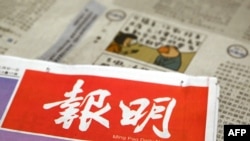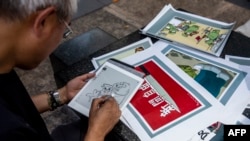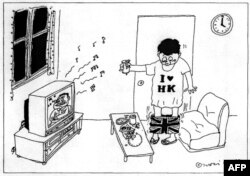A Hong Kong newspaper has pulled a popular, decades-old political comic strip after government officials accused it of smearing the government’s image and misleading the public.
The move is widely seen as another step in the erosion of freedom in Hong Kong under a controversial national security law.
Ming Pao, a respected Chinese-language newspaper, said Thursday it would stop publishing cartoons by Wong Kei-kwan, better known under his nom de plume “Zunzi,” starting Sunday.
“Ming Pao thanks Zunzi for witnessing with us the changing times in the past 40 years,” it said in a statement.
Wong’s books have also been pulled from public libraries, local media reported.
A search of “Zunzi” on Hong Kong public library catalogues yielded no results Friday. The government department in charge of public libraries told Ming Pao that books are regularly inspected and those allegedly violating national security or Hong Kong law would be removed.
In his four-decade career, Wong, 68, is well-known for his satirical sketches, which lampoon political figures from the British colonial period to Chinese-rule era after the 1997 handover of sovereignty. His cartoons have been published in Ming Pao since 1983 and some also appeared in Apple Daily and Next magazine -- which folded after the national security law came into effect.
“This is the outcome of a gradual development of the situation – it is a mutual decision,” Wong said in a carefully worded response. “To keep ‘one country two systems’ unchanged is harder than building a rocket in your backyard.”
China had promised to keep Hong Kong’s way of life unchanged for 50 years under the one country, two systems arrangement when the former British colony was handed back to its rule in 1997. But it has been widely criticized for eroding Hong Kong’s freedom in its imposition of the national security law on Hong Kong.
Observers say they had feared for Wong, as his cartoons have been censored six times by government officials in the past six months -- including the police and the Security Bureau.
The latest criticism came from Secretary for Home and Youth Affairs Alice Mak, who called a cartoon strip of Wong’s “distorting” and “unethical.” His three-panel strip, published Tuesday, showed a man saying Hong Kong’s community representatives will be chosen “as long as the leader finds them suitable” even if they do not pass their exams and health checks.
The strip followed last week’s government announcement of reforms to the district council election that drastically reduce the number of elected seats to just one-fifth of all seats, with the rest to be either appointed by the government or selected by committees staffed by pro-establishment figures.
Hong Kong’s security chief, Tang Ping-keung, said Thursday that Ming Pao editors had made a responsible decision to halt publishing “misleading” content that smeared the government.
Chung Kim-wah, a social scientist formerly with the Hong Kong Polytechnic University and now living in exile in the U.K., said the authorities see Wong as a thorn in the side because his cartoons are “simple and easy to understand … and often lampoon those in the position of power.”
He said Hong Kong media outlets now have to self-censor or face closing down, noting that Ming Pao has already cut some columns by authors seen as politically sensitive.
The city’s media outlets have long practiced self-censorship since its return to Chinese rule but press freedom has drastically deteriorated since the national security law was imposed by Beijing in 2020, after monthslong anti-government protests. Two influential pro-democracy outlets, the Apple Daily and Stand News, shut down after their assets were frozen by the police in 2021.
The national security law lays out penalties as severe as life imprisonment for crimes including secession, subversion, terrorism and collusion with foreign forces. The authorities have also invoked the colonial-era offense of sedition to prosecute government critics in recent years.
Veteran journalist and political commentator Johnny Lau said after politics, education and media, political pressure has now permeated the arts and cultural sector.
“This shows the weakness of the authorities,” he said.







